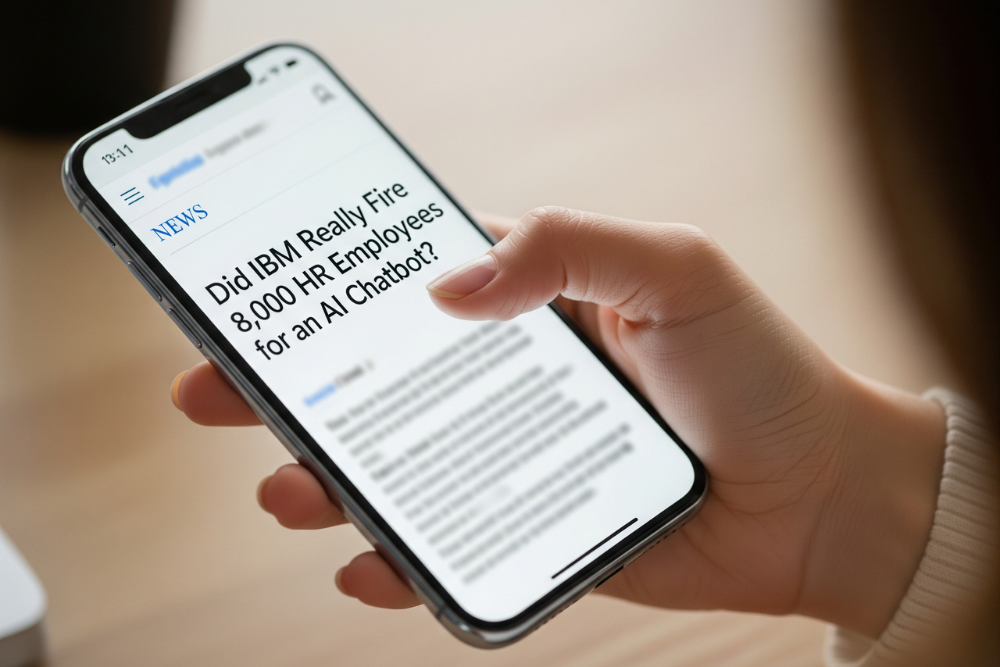You didn’t misread it. President Donald Trump recently suggested a $100,000 visa fee for companies looking to hire foreign workers under the H-1B visa program.
One hundred. Thousand. Dollars.
For a single temporary worker in a specialty occupation like a software engineer, QA analyst, or data scientist.
The move, clearly designed to stir political support ahead of the next election, also stirred something else: panic among U.S. employers, especially in tech and startups. The very people already struggling to fill roles due to skill shortages and ballooning local salaries.
The American Immigration Council has long stated that H-1B workers complement, not replace, U.S. workers, especially in high-demand fields. But now, instead of fixing the visa program, the Trump administration is proposing a price tag so extreme, it feels less like immigration reform and more like a velvet-gloved hiring ban.
For U.S. businesses, this isn’t just a policy issue , it’s a wake-up call.
And for companies already outsourcing talent through firms like iScale Solutions in the Philippines and Vietnam?
It’s confirmation that they’re playing the long game right.
What Is the H-1B Visa and Why Is It Suddenly So Expensive?
The H-1B visa is a nonimmigrant visa category used by U.S. employers to hire temporary foreign workers in specialty occupations, jobs that require a high level of education and skill, such as IT, engineering, or finance roles.
To even file an H-1B petition, the employer must:
- Secure a Labor Condition Application certified by the Department of Labor
- Prove that hiring a foreign worker will not adversely affect the wages or working conditions of similarly employed U.S. workers
- File the visa petition with USCIS
- Compete in the annual H-1B cap lottery due to overwhelming demand
And even after jumping through all of that? The visa application fee may soon be raised to a whopping $100,000, according to recent comments from President Trump.
The message to U.S. businesses is pretty clear: “You can hire top talent but we’re going to make it financially painful.”
Meanwhile, companies using outsourcing partners like iScale Solutions are:
- Hiring top-tier developers, analysts, and support teams in Asia
- Paying a fraction of the cost
- Onboarding talent in weeks, not months
- Skipping the visa chaos, paperwork, and politics
In 2025, offshoring isn’t just an operational strategy, it’s how smart companies survive broken systems.
Who Gets Hit the Hardest by the H-1B Visa Fee Hike?
This isn’t about keeping jobs in the U.S., it’s about pricing global talent out of the market.
If the proposed $100,000 H-1B visa application fee becomes reality, here’s who gets hit first:
Startups and SMEs
Small U.S. businesses who rely on nonimmigrant workers to fill urgent gaps in specialty occupations like software development, cloud engineering, and technical support. These aren’t just optional hires, they’re critical roles where the demand for labor exceeds the available local talent.
Tech Employers in a Talent Crunch
Even in FY 2025, USCIS data shows persistent shortages in the U.S. tech sector. These aren’t jobs being stolen, these are highly skilled foreign workers stepping in to keep U.S. products shipping and systems running.
Workers from Underrepresented Regions
Most H-1B visa holders come from India or China, but as the American Immigration Council has pointed out, there’s rising demand from Southeast Asia too. But if the visa classification becomes financially out of reach, nonimmigrant visa applicants from emerging markets like the Philippines or Vietnam are effectively locked out even if they’re fully qualified and eligible for this visa.
Employers Playing by the Rules
Ironically, the companies that follow every regulation, submitting a labor certification, ensuring prevailing wage compliance, filing the correct H-1B visa petition, and proving that the temporary worker will not adversely affect the wages and working conditions of U.S. citizens are the ones who’ll now be punished the most.
All while mega-corporations either swallow the cost or move operations abroad.
Here’s what many U.S. companies are realizing: the H-1B visa program is no longer a viable option. The petition process is slow, expensive, and getting more unpredictable by the year. And now, with this proposed visa fee hike, it’s becoming nearly impossible for most businesses to justify the investment.
Which is exactly why more and more companies are outsourcing their teams through iScale Solutions.

Will the Keep Call Centers in America Act Change Your Business?
The bipartisan Keep Call Centers in America Act of 2025 could reshape AI use, offshoring, and call center jobs. Is your customer service ready for the change?
Political Posturing vs. Practical Policy
This $100,000 H-1B visa application fee proposal has very little to do with protecting native-born workers in the United States, and everything to do with election-year optics.
Yes, the H-1B visa category has always been politically charged but lately, it’s become a talking point, not a talent strategy.
The Trump administration announced a new crackdown, claiming the fee would “put Americans first.” But the data, including from the American Immigration Council shows that foreign workers under the H-1B program don’t displace U.S. workers. They fill gaps in high-demand areas where labor exceeded the supply, especially in specialty occupations like software development, cybersecurity, and data science.
And let’s not forget the irony: while critics rage about temporary workers coming to “take jobs,” the U.S. government still issues nonimmigrant visas for fashion models under the same program.
This isn’t about fixing the visa program. It’s about weaponizing bureaucracy to score political points even if it means tanking innovation.
Take the “Keep Call Centers in America Act”, for example, a bill that sounds patriotic but ignores how modern global teams actually work. Now layer in the HIRE Act Bill, proposed by Senator Bernie Moreno, which includes a 25% tax on outsourcing. It’s a double bind: companies are blocked from hiring foreign workers through the H-1B visa program, then punished for outsourcing as a workaround. This isn’t strategy, it’s political theater that leaves employers with no good options.
If you’re a U.S. employer, here’s what you’re up against:
- You must file a petition with USCIS
- Secure a Labor Certification from the Department of Labor
- Prove the H-1B worker has at least a bachelor’s degree in a specialty occupation
- Demonstrate that hiring this nonimmigrant will not harm U.S. workers
- And now… possibly pay a six-figure visa fee
All of this just to get a chance at a nonimmigrant worker who might not even get selected in the H-1B registration process due to the annual visa cap.
Meanwhile, outsourcing partners like iScale Solutions help U.S. businesses:
- Hire top-tier professionals in the Philippines and Vietnam
- Skip the visa classification, petitioning, and embassy queues
- Avoid the mounting unpredictability of the H-1B visa program
- Start projects faster, cheaper, and with less legal overhead
You don’t need to wait for the fiscal year 2026 or navigate the ever-changing rules around entry to the United States. With iScale, you can access the talent you need now, without betting your growth on a broken system.
If the goal is to “protect American jobs,” maybe it’s time to admit that real protection starts with keeping businesses alive and that means giving them practical ways to access the global workforce.
By working with dedicated development and support teams in the Philippines and Vietnam, companies can bypass the broken U.S. visa system entirely. No lottery. No petition for a nonimmigrant worker. No six-figure fee. Just highly skilled professionals working on real problems without the politics.

Will the Keep Call Centers in America Act Change Your Business?
The bipartisan Keep Call Centers in America Act of 2025 could reshape AI use, offshoring, and call center jobs. Is your customer service ready for the change?
What Smart Companies Are Doing Instead
Let’s talk numbers, not just the $100,000 visa application fee that President Trump has floated, but the true cost U.S. businesses will pay if this becomes reality.
Because this isn’t just about immigration law, it’s about operational survival.
The H-1B visa program, originally designed to allow U.S. companies to petition for highly skilled nonimmigrant workers in specialty occupations, is being buried under political noise and bureaucratic burden.
Already, the petition process is a minefield. Employers must:
- Secure a Labor Certification from the Department of Labor
- Ensure compliance with prevailing wage rules
- Prove that the temporary worker will not harm U.S. workers
- File the petition with USCIS and hope for selection
- Navigate processing timelines that often stretch past the fiscal year
And now, possibly pay six figures just to apply?
That kind of fee would cripple startups and mid-size companies. It would force hiring freezes, delay product launches, and drive businesses to relocate operations abroad just to access skilled talent. All this while unemployment rates in key U.S. tech occupations remain relatively low, according to recent American Immigration Council data.
Let’s not forget: the H-1B visa classification is three years (with the possibility of a three-year extension), meaning companies would be paying a premium for something they may not even keep long-term. Not to mention the delays in employment authorization, constant policy shifts, and the looming threat of new bans (yes, the administration announced a new travel restriction, again).
Here’s the uncomfortable truth for U.S. employers: the H-1B visa category is no longer a dependable pipeline for critical talent. The entire visa program has become a gamble, one where companies bet big and often walk away with nothing but legal fees and empty desks.
Which is why so many companies are pulling the plug on the H-1B mess and moving toward something that actually works: outsourcing talent through iScale Solutions.
By building teams in the Philippines and Vietnam, businesses can:
- Hire developers, data analysts, support engineers, and more
- Avoid the visa classification, travel bans, and bureaucratic hoops
- Scale faster and at lower cost without sacrificing quality
- Stay focused on growth, not paperwork
You don’t need to prove your foreign worker has experience in the specialty or argue that the hire won’t adversely affect the wages of U.S. employees. You just get the right person on your team and get back to work.
As more and more H-1B employers explore the cost of compliance and delays, they’re realizing the real fee isn’t just financial, it’s lost momentum, missed opportunities, and falling behind global competitors who are already hiring smarter.

Did IBM Really Fire 8,000 HR Employees for an AI Chatbot?
IBM layoffs in 2025 fuel debate: Did AI replace thousands of HR employees, or is the story more complex? Discover what really happened and what workers must do next.
Talent Doesn’t Wait for Politics
The truth is, global talent doesn’t sit around waiting for the next U.S. policy shift or visa category update.
While the USCIS weighs proposals, the Department of State adjusts guidelines, and the White House announces new travel bans, real businesses need real people right now. Whether it’s an engineer, a data analyst, or a project manager, companies can’t afford to press pause while they wait to find out if a visa application may be accepted or if a petition will be delayed again.
The H-1B visa program was built for a different era. It assumed that foreign workers must be physically present in the U.S. to contribute that the only way to access global talent was to get them entry into the United States. That assumption no longer holds.
Today, we have the infrastructure to perform services in a specialty occupation from anywhere in the world securely, compliantly, and effectively.
And yet, businesses are still being punished for trying to do the right thing. The current system forces them to file a petition, obtain labor certification, work through the office of foreign labor certification, and attest that hiring a nonimmigrant worker won’t adversely affect similarly employed U.S. workers — all for a chance to bring in a single temporary worker whose application may be rejected anyway.
Add a new fee, possibly $100,000, and the message becomes crystal clear: the H-1B visa route is broken.
That’s why companies looking to grow in 2025 and beyond are turning to partners like iScale Solutions. Instead of navigating a failing visa program, they’re hiring directly from talent-rich regions like the Philippines and Vietnam where high-quality professionals are ready to work in specialty occupations without the paperwork, delays, or policy risk.
The American Immigration Council notes that global talent drives innovation, supports growth, and strengthens industries whether they’re working on-site or offshore. What matters is what they bring to the table not whether a nonimmigrant visa was stamped.
So here’s the bottom line:
You don’t have to wait for a new H-1B cap, another election, or an agency to decide whether a visa should be granted. You can hire smarter and do it now.
iScale Solutions helps you build global teams without borders. No lottery. No uncertainty. Just world-class talent, delivered.
Ready to skip the broken visa system and start building your team today? Let’s talk about how we can help you scale faster, smarter, and stress-free. Contact us here!


